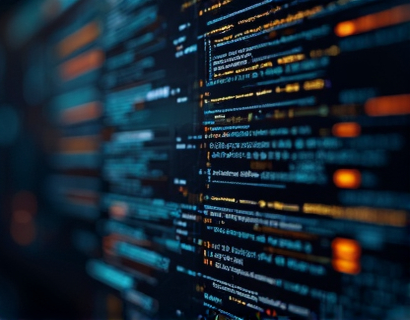AI and Crypto: Transforming Digital Finance for the Future
The intersection of artificial intelligence (AI) and cryptocurrency is revolutionizing the landscape of digital finance. This convergence is not just a technological curiosity but a transformative force that is reshaping banking and financial services. The integration of AI and crypto is offering a more efficient, secure, and personalized experience for tech and finance innovators. This article delves into the ways AI and cryptocurrency are merging to create a new era in digital finance, focusing on the benefits and potential of this synergy.
Enhanced Efficiency in Financial Transactions
One of the most immediate impacts of AI in the crypto space is the enhancement of transaction efficiency. Traditional financial systems often suffer from slow processing times and high transaction fees. AI algorithms can analyze vast amounts of data in real-time, optimizing transaction routes and reducing delays. Smart contracts, powered by AI, can automate and execute transactions with precision, eliminating the need for intermediaries and significantly lowering costs. This efficiency is particularly beneficial for cross-border payments, where AI can navigate complex regulatory environments and streamline processes.
Moreover, AI-driven platforms can predict and adapt to market conditions, ensuring that transactions are processed during optimal times. Machine learning models can identify patterns and anomalies, further enhancing the speed and reliability of financial operations. For instance, AI can dynamically adjust the parameters of a smart contract based on real-time market data, ensuring that transactions are both swift and cost-effective.
Improved Security Measures
Security has always been a paramount concern in the crypto world, and AI is playing a crucial role in fortifying defenses against cyber threats. Traditional security measures often rely on static rules and protocols, which can be easily bypassed by sophisticated attackers. AI, on the other hand, can learn from vast datasets to identify and respond to threats in real-time. Machine learning algorithms can detect unusual patterns and behaviors, flagging potential security breaches before they occur.
AI-powered security systems can also enhance the authentication process for crypto transactions. Biometric data, such as fingerprints and facial recognition, can be integrated with AI to create multi-layered security protocols. This not only increases the difficulty for unauthorized access but also provides a seamless user experience. Additionally, AI can continuously monitor network activity, updating security measures to counter emerging threats, ensuring that user assets remain protected.
Personalized Financial Services
The personalized experience offered by AI in digital finance is a game-changer. Traditional banking systems often treat customers as homogeneous entities, failing to cater to individual needs and preferences. AI, however, can analyze user data to create tailored financial solutions. For example, AI algorithms can assess a user's spending habits, investment goals, and risk tolerance to recommend customized investment portfolios. This level of personalization is particularly valuable in the crypto space, where the diversity of assets and the complexity of trading can be overwhelming for many users.
AI-driven financial advisors can provide real-time insights and recommendations, helping users make informed decisions. These advisors can adapt to changing market conditions and user preferences, offering dynamic advice that evolves over time. Furthermore, AI can simplify the process of managing multiple crypto assets by automating tasks such as portfolio rebalancing and tax optimization, ensuring that users can focus on their broader financial goals.
Enhanced User Experience
The user experience in digital finance is being significantly enhanced through the integration of AI and crypto. User interfaces powered by AI can learn from user interactions, adapting to individual preferences and improving over time. This results in a more intuitive and user-friendly experience, reducing the learning curve for new users. AI can also provide context-aware assistance, offering help and guidance based on the user's current task or query.
Chatbots and virtual assistants, driven by AI, can handle a wide range of customer inquiries, from basic account management to complex trading strategies. These AI-powered assistants can operate 24/7, ensuring that user support is always available. Natural language processing (NLP) capabilities allow these assistants to understand and respond to user queries in a natural, conversational manner, making the interaction more seamless and efficient.
Innovative Financial Products and Services
The combination of AI and crypto is giving rise to innovative financial products and services that were previously unimaginable. Decentralized finance (DeFi) platforms, for instance, leverage AI to create more sophisticated and accessible financial instruments. AI can optimize lending and borrowing processes, ensuring that both borrowers and lenders benefit from fair and efficient terms. AI-driven risk assessment models can evaluate creditworthiness with greater accuracy, reducing the risk of default and expanding access to credit for underserved populations.
Stablecoins, which are designed to maintain a stable value, can be managed more effectively with AI. These coins are crucial for reducing volatility in crypto transactions and storing value. AI can monitor market conditions and adjust the supply of stablecoins in real-time, maintaining stability and trust in the system. Additionally, AI can facilitate the creation of new financial products, such as AI-powered insurance policies that use predictive analytics to assess risk and set premiums accordingly.
Regulatory Compliance and Transparency
Regulatory compliance is a significant challenge in the crypto space, but AI is helping to address this issue. AI can automate the process of monitoring and reporting transactions to ensure compliance with regulatory requirements. Machine learning models can analyze transaction data to identify potential money laundering or fraudulent activities, alerting authorities and facilitating timely interventions. This not only helps in maintaining the integrity of the financial system but also builds trust among users and regulators.
Transparency is another area where AI shines. Blockchain technology, inherently transparent, can be enhanced by AI to provide real-time insights into transaction histories and asset movements. AI can generate detailed reports and visualizations, making it easier for users and regulators to understand complex financial activities. This level of transparency is crucial for fostering a trustworthy and accountable financial ecosystem.
Challenges and Considerations
While the potential of AI and crypto in digital finance is immense, there are several challenges and considerations that must be addressed. One of the primary concerns is the regulatory landscape. The rapid evolution of AI and crypto technologies often outpaces existing regulations, creating a gray area that can lead to legal and compliance issues. It is essential for stakeholders to work closely with regulators to develop frameworks that balance innovation with safety and security.
Another challenge is the technical complexity involved in integrating AI with crypto systems. Developing robust and scalable solutions requires expertise in both AI and blockchain technologies. There is also the issue of data privacy and security, as the extensive data collection required for AI algorithms must be handled with utmost care to protect user information. Ensuring that AI systems are transparent and explainable is crucial for building user trust and compliance with data protection regulations.
Future Prospects
The future of digital finance is bright, with AI and crypto continuing to drive innovation and transformation. As AI algorithms become more advanced, we can expect even more sophisticated financial products and services. The integration of AI with other emerging technologies, such as quantum computing and the Internet of Things (IoT), will further expand the possibilities in the financial sector. AI-driven predictive analytics will become more accurate, enabling better decision-making and risk management.
The adoption of AI and crypto in digital finance is not limited to developed economies. Emerging markets can leapfrog traditional financial systems by embracing these technologies, providing access to financial services for millions of unbanked individuals. This democratization of finance has the potential to drive economic growth and reduce inequality on a global scale.
In conclusion, the convergence of AI and crypto is transforming digital finance, offering a more efficient, secure, and personalized experience. While challenges exist, the benefits and potential of this synergy are undeniable. As the technology continues to evolve, it will play an increasingly vital role in shaping the future of finance, making it more accessible, transparent, and user-centric.










































